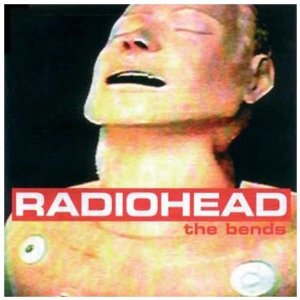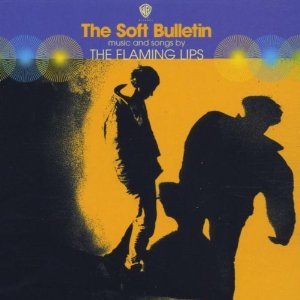bLISTerd: The 100 Best Albums of the ’90s (40-31)
by Popblerd Staff on Nov 1, 2011 • 4:00 pm No CommentsWho needs a preamble? This is the good part! Let’s keep it movin’!!
You can start backtracking here.
 40. Radiohead | The Bends (released 3/21/95 on Capitol Records | 1.5 million)
40. Radiohead | The Bends (released 3/21/95 on Capitol Records | 1.5 million)
While it may lack the grand concept and experimental sounds of the highly acclaimed OK Computer, Radiohead’s The Bends is, for my money, the perfect marriage of the band’s later year weirdness and genre-bending style with the accessible anthem rock of Pablo Honey. Upset and frustrated by the success of their first album, especially the insane enthusiasm for their single “Creep”, Radiohead sought to distance themselves from the “Nirvana-lite” sound of that record with their follow-up. The result is a far more mature album that retains its catchy accessibility while offering enough lyrical and musical depth to keep the record engaging a dozen spins later. From the fame-inspired angst of “My Iron Lung” to the acoustic and falsetto “High and Dry” (whose sound essentially gave birth to a dozen future artists, including Coldplay) to the distortion screamer “Just”, the album deftly jumps between sound textures while still remaining coherent thanks to Yorke’s delivery and cryptic, dark lyrics. The wistful “Fake Plastic Trees” and the emotionally draining ghost of “Street Spirit” foreshadow the themes of later works, but make no mistake: The Bends’ value isn’t simply as a stepping stone for magnum opus OK Computer; it stands in its own right as a masterpiece.-Stephen
39. Beastie Boys | Check Your Head (released 4/13/92 on Capitol Records | 2.2 million)
If you know the Beastie history you know this album came out of nowhere. And that it is awesome. Music “fans” that hate when their favorite band tries something radically different need to be reminded of the level of awesome that hearing “Wha Cha Want” blasting from a passing car for the first time was like. The album came in the midst of the Beasties California-phase. Hell, Cypress Hill guests on the remix to “What Cha Want” The sound is now vintage BBoys yet the lyrics are their least New York-referenced of any of their albums. CYH also has the distinction of containing one of the worst rhymes in rap history on “Pass The Mic” when “commercial” is rhymed with “commercial”.-Tom
38. Megadeth | Rust in Peace (released 9/24/90 on Capitol Records | 879K)
You probably remember going to school with at least one outcast kid. He was kind of scrawny and a little weird, got picked last in gym class, and he couldn’t even pay girls to talk to him. And then some time between the end of junior high and the start of high school he had grown about five inches taller and put on like 20 pounds of muscle. All of a sudden other kids stopped making fun of him and started clearing the fuck out of his way in the halls. Yeah, Megadeth became that kid with the release of Rust in Peace in 1990.
True, the group had already built a strong reputation among metalheads based on the release of one classic metal album (Peace Sells… but Who’s Buying?) and two very good ones (Killing Is My Business… and Business Is Good! and So Far, So Good… So What!) in the ’80s, but no one – least of all me – was prepared for this album. Bandleader Dave Mustaine, sober for the first time in some time, brought in Nick Menza on drums and Marty Friedman on guitar, and the band’s now-classic lineup wasted no time in staking Megadeth’s claim as one of the best metal bands on the planet.
There is not a dull moment or a wasted note on Rust in Peace. Mustaine and Friedman weave their complex and high melodic guitar parts seamlessly, while Menza and bassist Dave Ellefson provide a rhythmic foundation with punch and balls to spare. Overall the effect is one of aggression and fury, but with surgical precision. Every note, every beat has a purpose here. And that purpose is to turn your speakers to dust.
But what puts this album over the top in my mind is the masterful production by Mustaine and Mike Clink, as well as Max Norman’s mixing. While many metal bands were still wallowing in the cavernous, tinny sound of the ’80s this is a thoroughly modern and timeless-sounding disc that befits the timeless material written by the band.-The Man in the Gray Flannel Suit
37. Portishead | Dummy (released 10/18/94 on London Records | 1.2 million)
Portishead came seemingly out of nowhere in 1994 with Dummy. At the time, it was one of those records that immediately stuck out as something strikingly new in popular music. Beth Gibbons’ haunting vocals are the perfect complement to the dark and moody yet seductive and sexy musical backdrop provided by band mates Geoff Barrow and Andrew Utley. The album met only critical acclaim in the US, peaking at #79 on the Top 200 (yet achieving Gold status), but reached #2 on the UK charts. The only single to have any level of exposure in the US was “Sour Times”, which only peaked at #53, but quickly became a staple among the 120 Minutes crowd. Dummy retains its freshness and is oft cited as one of the decade’s best LPs (and deservedly so). Incidentally, Dummy is the latest album to get the 33 1/3 treatment from Continuum’s well curated series.-Dr. Gonzo
36. Stone Temple Pilots | Core (released 9/29/92 on Atlantic Records | 5 million)
“I am smellin’ like the rose that somebody gave me on my birthday bed, I am smellin’ like the rose that somebody gave me ’cause I’m dead and bloated!” These were the words that introduced me to Stone Temple Pilots. Those words, unaccompanied by music until the song “Dead & Bloated” kicks in soon after, open their debut album Core. Upon appearing on the music scene in 1992 with said debut, many rock journalists were quick to categorize Stone Temple Pilots as Pearl Jam clones. Many of these music critics (hacks) accused the band of hastily throwing together some grunge songs that would sound good on the radio and cashing in on a current trend. The fact of the matter is that brothers Dean and Robert DeLeo (guitar and bass respectively) are excellent songwriters who crafted an impeccable hard rock album and got themselves an enigmatic frontman in the vocally gifted Scott Weiland, who, for the record, is no Eddie Vedder clone, but an entity unto himself. Lead single “Sex Type Thing” was somewhere between radio friendly hard rock and heavy metal (MTV relegated it to Headbanger’s Ball at the onset), but was undeniably catchy and sparked huge interest in the band amongst the rock buying public. But it was the release of second single “Plush”, which had a less aggressive tone than it’s predecessor, that launched the band into the stratosphere. Despite the disdain of rock critics the world over, the public openly embraced STP and they would go on to become one of the biggest rock bands of the ’90s with subsequent releases. This album was their more than enjoyable introduction to the world at large. –Nick
 35. Flaming Lips | The Soft Bulletin (released 6/22/99 on Warner Brothers Records | 353K)
35. Flaming Lips | The Soft Bulletin (released 6/22/99 on Warner Brothers Records | 353K)
Best known previously for their 1993 hit “She Don’t Use Jelly”, The Flaming Lips changed all that in 1999 with the release of The Soft Bulletin. Although still retaining the experimental edge that endeared them to their fans, they opened themselves up to a whole new audience with as accessible of an album as they had done. The Soft Bulletin set the stage for the larger commercial breakthrough that was to come in 2002 for the band with Yoshimi Battles The Pink Robots.
Mixing traditional rock instruments with electronic and orchestral sounds, this is truly one of those ‘headphone albums’ that can’t truly be appreciated without at least one devoted, undistracted listen. There is so much going on musically, the production is top-notch, but Wayne Coyne’s lyrics should not be overlooked either. The Soft Bulletin ventured away from some of the sillier, non-sensical topics of earlier Flips works and Coyne tackles some big subjects. If there’s a more beautiful song that takes on our mortality than “Feeling Yourself Disintegrate”, I’ve yet to hear it. “Suddenly Everything Has Changed” perfectly exemplifies how big life events (be it a death, birth, loss of a job, you name it) delivers a shock to our daily mundane routines. The piano based ballad “Waitin’ For A Superman” sums up how we so often look for that superhero or savior to take all our problems and the heavy weight on our shoulders away.
For me, the crowning achievement here is album opener “Race For The Prize”. Kicking right in with bombastic drums, Coyne tells the story of two scientists battling to be the first to find a cure. The key line of the chorus, ‘they’re just humans with wives and children’ reveals despite what we may be competing or fighting over, we truly all want the same basic things and would be better off working together, something its doubtful humanity will ever fully grasp. Throw in the gorgeous melody and string arrangement and its one of the greatest tracks The Flaming Lips have recorded. Majestic, life affirming and introspective, The Soft Bulletin is The Flaming Lips’ masterpiece.-Mike A.
34. Beastie Boys | Ill Communication (released 5/31/94 on Grand Royal/Capitol Records | 2.3 million)
Ill Communication is the BBoys at their peak and their last album on which they were unabashedly ‘cool’. The bass to “Root Down” is my all time favorite sample. The amount of swagger and humor on “Get It Together” would kill about any guest other than Q-Tip (or possibly the late ODB). Like Weezer’s “Buddy Holly”, “Sabotage” was perfectly paired with Spike Jonze’s madness at just the right moment in time, when MTV was in the final stages of letting music videos dominate their programming. Sure, on MCA’s first album as a Buddhist he manages to sneak in a line about giving respect to the ‘mothers, sisters, and the wives and friends,’ but juxtapose to ‘brand new doo guaranteed like Yoo-Hoo’ it was hardly noticeable. How were we to know he was later going to go all “Song for the Man” on us, just four years later?-Tom
33. Green Day | Dookie (released 2/1/94 on Reprise Records | 8.1 million)
This album is forever linked to Weezer’s blue album for me (mainly because I alternated between the two in my name-brand discman for most of middle school). Something (very different in each) changed inside Billie Joe and Rivers Cuomo after the commercial success of their smash albums. They also had to deal with the fact they could not be youthful (different kinds of) punks forever. But, on Dookie, none of this mattered. They hadn’t repurposed a song for the Godzilla soundtrack (complete with sound effects). You could still hear the dirt on the band skin. They were cool, anti-all-establishments and Billie Joe didn’t know the difference between a democrat and republican and that was a good thing. When Dookie came out you were cool if you knew about the hidden track on the CD. You were really cool if your CD had a brown jewel case edge (as opposed to the black case in later reprints). Dookie also produced the added bonus of getting a song about masturbation played on mainstream radio.-Tom
32. Hole | Live Through This (released 4/12/94 on DGC/Geffen Records | 1.6 million)
Today, Courtney Love seems most (in)famous for her highly publicized battles with both the law and drugs, as well as being Kurt Cobain’s girlfriend. Sadly, these often overshadow the fact that she was one of the masterminds behind one of the best alternative albums of the decade. Hole broke onto the scene with their debut album, Pretty on the Inside, an explosive study in punk and noise rock, but it was their second album, Live Through This, that solidified their status as a premier rock band of the time. Combining the grunge-heavy style of the time with Love’s uniquely feminine perspective, the album bounces effortlessly between vulnerability and rage, buoyed by Love’s ability to go from delicate to deranged at a moment’s notice. Opener “Violet” kicks things off with Love in full fury mode, hauntingly screaming, “Go on take everything. Take everything. I want you to.” Elsewhere, the driving and at times even poppy music masks darker topics, including suicide on “Miss World”, child custody and motherhood on “Plump”, sexual assault on “Asking for It”, and troubled childhoods on “Softer, Softest”. The project really gels around “Doll Parts”, however, a soft three chord ballad with an infectious chorus of “Someday you will ache like I ache”. It’s the perfect example of what Hole was able to accomplish with Live Through This and why it remains one of the best albums, not just of the 90’s, but of all time: an honest interplay of beauty and ugliness, of hope and despair, backed by tight instrumentation and Love’s utterly unique delivery.-Stephen
 31. Fiona Apple | Tidal (released 7/23/96 on Epic Records | 2.9 million)
31. Fiona Apple | Tidal (released 7/23/96 on Epic Records | 2.9 million)
As much as I love Tidal, I know that I’m not the perfect person to write about it. I asked one of my best friends if she would like to write something about it. She said yes. And this website is much better for it. Enter Jessica Nagy …
Fiona Apple’s Tidal came out in 1996, when the artist was only 18 years old. The critics clucked that her skills as a performer were held back by her immature compositions, and called her lyrics overwrought and confused. That is okay. She didn’t write Tidal for them. I was sixteen, overwrought, confused, and I felt like every track existed to explain my drives and anxieties to the world. Her voice would slide from an angry growl, to a sexy purr, to a high, choirgirl’s wail. Sometimes her lyrics bounced from hostility, to anxiety, to vulnerability, to sexual abandon in just one song. Sometimes she pounded jazzy chords out of the lowest keys on the piano like it was a percussion instrument, and sometimes she slowly poured out one note after another into a pretty melody. What made her better than other songwriters who sang the blues of coming of age radiated behind the imperfect songwriting and virtuoso musicianship – Fiona Apple’s drive to speak and create would not let her rest, and she was exhausted.
Some great songs hit the radio during my junior year, like “Shadowboxer”, “Sleep to Dream”, and “Criminal” (with its creepy video that highlighted Fiona’s magnetic eyes and hollow ribcage. She rolled around in her long hair and underwear, parading her issues for the MTV viewing audience. I felt concerned and envious. She was the coolest girl I could imagine.) These songs sold cds and made Fiona famous and beloved. I loved belting out the hits in the car, but the two songs on the album that felt most powerful to me never came out as singles. The album’s final track, “Carrion”, somehow embodies all the moodiness and confusion the critics complained about, but uses those contradictions to tell the story. In the verses, she croons to her lover in a soft, smoky whisper that she is finished: “Won’t do no good to go no distance / The space between us is as boundless as the dark / Won’t do no good to throw no fist, babe / You can’t intimidate me back into your arms / Because honey I’ve gone away / I’ve gone away / I’ve gone away.” And then … the music soars, her voice lifts and sharpens, and she despairs in her plan because: “My feel for you boy, is decaying in front of me / Like the carrion of a murdered prey / And all I want is to save you, honey / Or the strength to walk away.” Despite the two different messages in the lyrics, you know she knows exactly what she wants to say and that she has been there. “Sullen Girl”, written about her rape at the age of 12, is a brief, atmospheric piece with arguably the best lyrics she has ever written. She doesn’t recount the specific trauma, but paints a picture of loss of innocence. “They don’t know that I used to sail the deep and tranquil seas / but he washed me ashore and he took my pearl / and left an empty shell of me.” A teenage girl does not need to be raped to feel like she has lost her pearl, and that is what makes so many women identify with this song. Fiona Apple learned a lot from Tidal. Her second and third albums build on what worked with a lot less of what didn’t, but it still stands on its own as great music and a sophisticated look inside the mind of one teenage girl – and through her, all teenage girls.-GG

